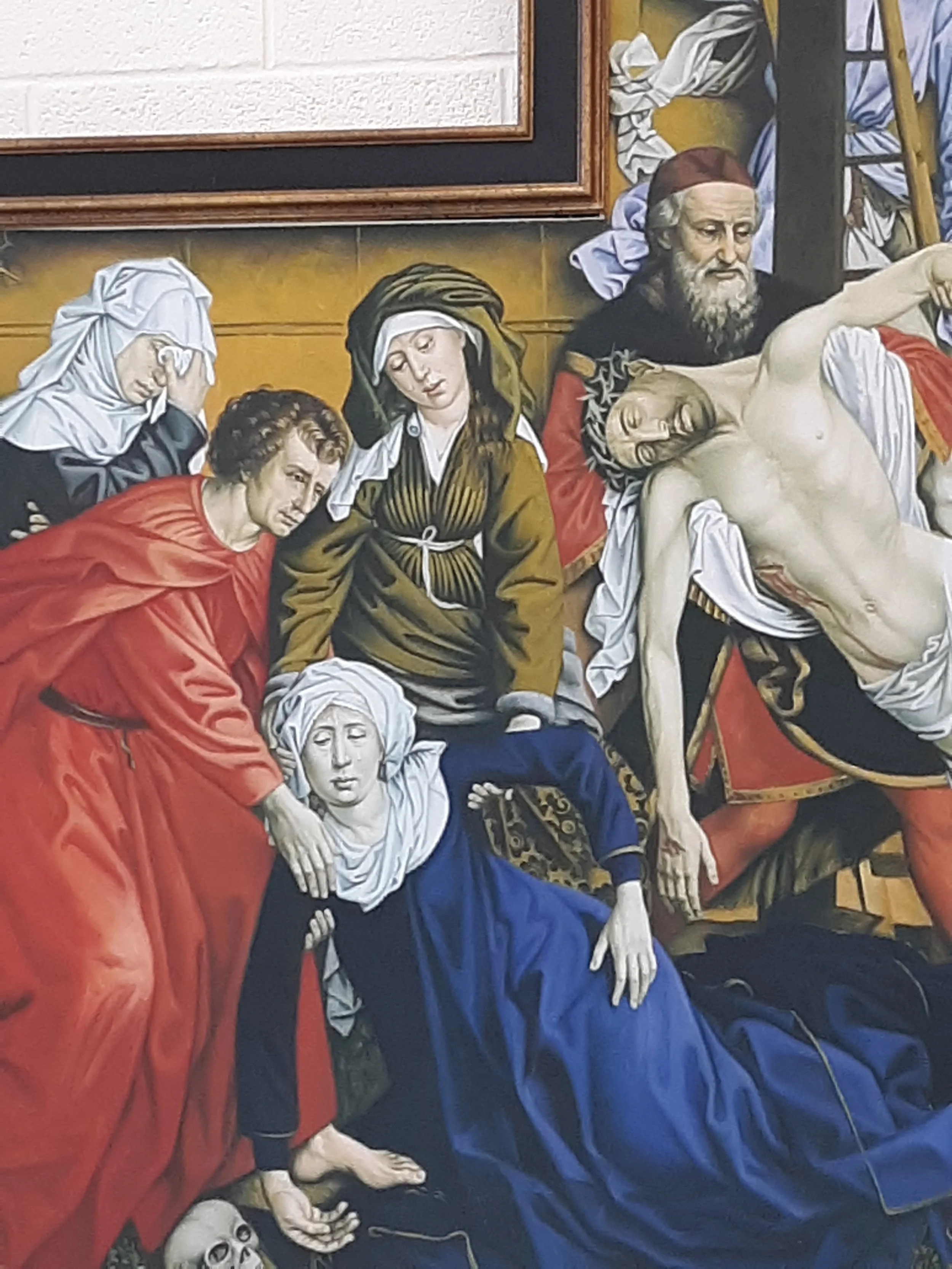Reconciliation with God: Fourth Sunday of Lent
O God,
who through your Word
reconcile the human race to yourself in a wonderful way,
grant, we pray, that with prompt devotion and eager faith
the Christian people may hasten toward the solemn celebrations to come.
Through our Lord Jesus Christ, your Son,
who lives and reigns with you in the unity of the Holy Spirit,
God, for ever and ever.
– Collect, Fourth Sunday of Lent –
When I was a young girl (probably about 10), I decided to spin my little brother (who was probably about 8) in a swivel chair in the kitchen. At first it was fun and then faster and faster and faster. Amidst laughs, he shouted, “stop!” and either I didn’t hear him or I considered it a cry of enjoyment (like children scream when they are being tickled and you know they are in no real danger). Doing the only rational thing available, he stuck out his hand and grabbed the refrigerator door to bring himself to an abrupt halt… and in the process pulled his arm out of its socket. Of course, he had to go to the doctor, painfully have his elbow pushed back into its socket, endure a few weeks of a cast, and go through the healing process.
I have always marveled at how quick my brother was to forgive me in playing too rough with him. He never got mad, never bore a grudge, never said any harsh words to me about this experience, and even today we laugh about it. I think in his heart he always understood that I love him and did not mean to harm him. On the other hand, I felt horribly guilty (and to a limited extent still do), but his instant forgiveness and understanding has really washed away any self-loathing I could feel from this unfortunate sibling bonding experience. Forgiveness is like that, healing and restorative. The experience does not go away, but the only way to move forward is in love.
This Sunday is another loving invitation to repentance, a call to be reconciled with God. Like many of the Lenten Collects, this collect offers us a gentle reminder of the joys to come and simultaneously another loving admonition to repent and be reconciled to God, through Jesus Christ. Throughout Lent, we are reminded of the words from the Prophet Joel, “Return to the Lord your God, for he is gracious and compassionate, slow to anger and abounding in love, and he relents from sending calamity.” (Joel 2:13).
This prayer asks a sobering question:
Do we truly believe that God loves us? How well do we live that?
This prayer mentions that God reconciles the human race to Himself in a wonderful way. Of course, this takes place through the Word Incarnate, Jesus Christ. Part of the mystery of God's plan for our salvation was that His Son should be persecuted, suffer death, and rise from the dead. In the divine plan for salvation, the precious Blood of Jesus Christ, the Paschal Lamb, was poured out for the redemption of our sins. However, He did not leave us orphans but promised to send us an Advocate, the Paraclete, the Holy Spirit. In a mysterious way, the Holy Spirit works with us, within us, burrowing to the depths of our souls to help move us back to God through our cooperation. Cooperating with this grace, we are transformed into the image and likeness with which God created us, but which was marred by the original sin of Adam. As the Catechism states, "The vocation of humanity is to show forth the image of God and to be transformed into the image of the Father's only Son." (CCC 1877).
An important and necessary part of our transformation takes place through the trials and sufferings we must endure. The Holy Spirit steps in to enable us to suffer "well". To suffer "well" happens when the Holy Spirit transforms suffering into salvific love. Our suffering is a share in Christ's suffering. The trials we endure and the suffering we undergo only find meaning in His suffering, because then we participate in His Paschal Mystery. As Dominum et Vivificantem states, "the Holy Spirit will enter into human and cosmic suffering with a new outpouring of love, which will redeem the world." (DeV 39). This "new outpouring of love" involves a total transformation of our humanity as it brings each individual into closer union with God and, in actuality, transforms us into God (deification). How can we rejoice that God’s only Son suffered and died on a cross?
The answer is quite simple: love.
Recall how God reveals Himself to Moses when He gave the 10 Commandments, “The Lord, the Lord, the compassionate and gracious God, slow to anger, abounding in love and faithfulness, maintaining love to thousands, and forgiving wickedness, rebellion and sin.” (Ex 34:6-7). The joy with which we hasten to celebrate the Easter Mysteries is the same “haste” God shows our contrite hearts in showering us with compassion and forgiveness. In the Passion, “Though your sins are like scarlet, they shall be as white as snow; though they are red as crimson, they shall be like wool.” (Isaiah 1:18).
Do we live like we believe this?
Our Gospel reading today reminds us that God is a loving Father (as quick to forgive as my younger brother). He stands waiting to forgive us, anticipating lavishing His love upon us. This Sunday is a gift to us: an invitation to be reconciled that we may be prepared to hasten toward the joyous celebration of the Resurrection. Saint Thomas Aquinas has this beautiful line which I think (in a nutshell) makes sense of the Crucifixion: “Nothing can provoke love more than to know that one is loved.” (Rationes Fidei, 5). In the Crucifixion, we see that characteristic Christian paradoxical union of joy and suffering and where love exists it works wonders.
This point in Lent prompts the questions:
How well am I responding to God’s love for me? How well am I living the Christian life?
Am I daily struggling to live it well?
Have I yet resisted sin to the point of shedding blood?
These questions are questions we ask during Lent, and honestly throughout our lives. The Christian life is a constant call to conversion. Living the Gospel is not easy; it is a continuous struggle, a constant conversion. “Human nature is inclined to what is easy, and the observance of discipline… is always unpleasant to human nature.” (Pope Piux XII, Feb 11, 1958). We love comfort and it takes something like the season of Lent to help us see how stuck in a rut or lazy we’ve become. We need this season to rouse our fervor for discipline, to wake us from our sin, to shake our conformity to the world and to reconcile us to God.
Being reconciled to God also prompts the question of how well am I forgiving others?
We pray in the Lord’s Prayer, “forgive us our trespasses AS we forgive others.” When we withhold forgiveness from others we block ourselves from receiving God’s forgiveness. We do not block God from giving it. We put a block or a barrier on God’s grace to prevent it from operating in our lives.
Today, let Him provoke you to love others since we have proof in the Passion that He loves us. Let His love penetrate our hearts and allow us to love others, to forgive as our heavenly Father has forgiven us, so that with prompt devotion and eager faith the Christian people may hasten toward the solemn celebrations to come.





